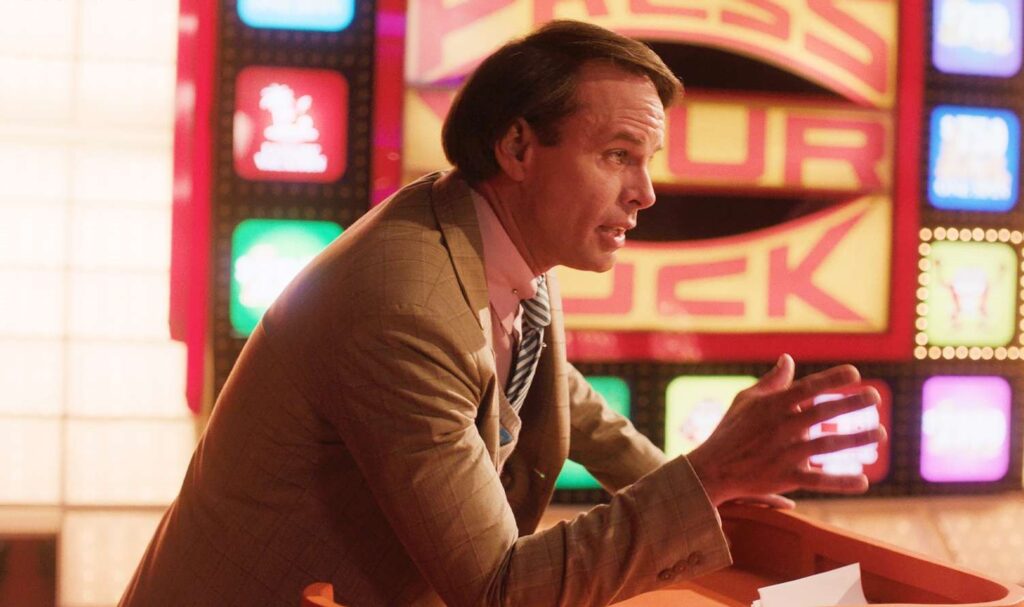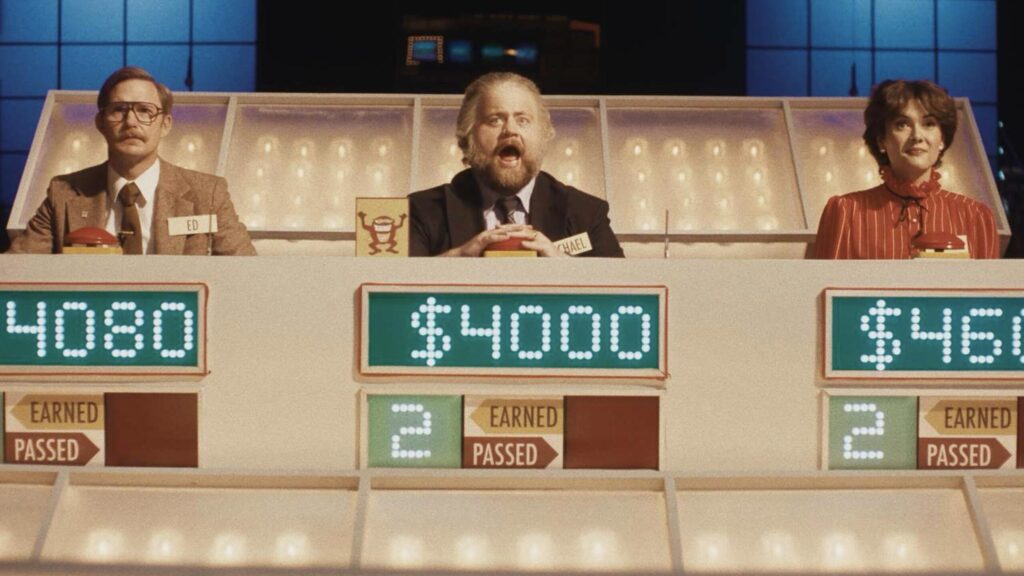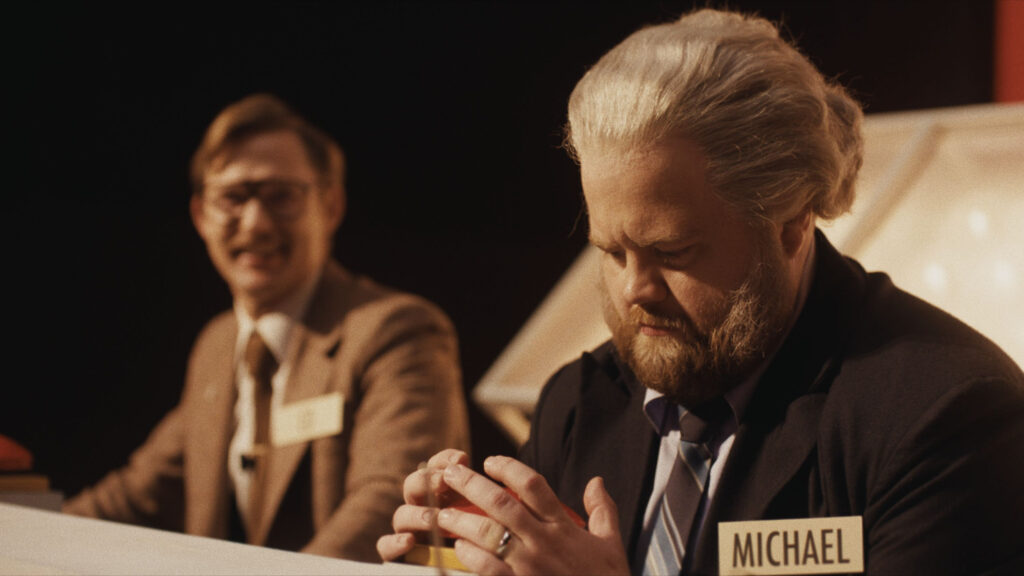Grand Larsony
I frankly would not have believed a story this small would work as a movie if not for the good word of mouth. It certainly doesn’t have enough material for a feature on the pitch alone. It might be enough to make you curious, enough to make a memorable prime-time news segment or magazine article: A man cracks the code of the game show Press Your Luck to win seemingly infinite money so long as he can keep his nerve. That’s a hook, sure. But it’s not a story.
And yet The Luckiest Man in America works. Credit to the writers and filmmakers for figuring out how to use visual style and well-rendered character sketches to build something a proper movie, with real flavor. Terrific staging, little swerves into dream logic, and set production depicting a gameshow hellscape give the film a backbone. The film has just enough palm-sweating suspense to be one of those comedy-dramas that’s more an uncomfortable thriller. It’s what indie filmmaking ought to be: idiosyncratic, stylized, pushing past its limitations with voice and character. Give me more movies like this.

The real life premise: it’s 1984, and Michael Larson (Paul Walter Hauser) is a broke Ohio ice cream truck driver with a gambler’s instinct and love of any sort of hack-the-system scheme. One day, he sneaks into a casting audition of Press Your Luck and, after charming the right producer (David Strathairn) with his loser quirkiness, ends up on the show. I don’t want to spoil exactly what happens in case you don’t already know the historical outcome, but it’s fascinating enough to be trivia for any lovers of TV history and small-scale enough to have only appeared in local papers.
(I’ll note that, unlike some of my online movie friends, I have no exposure or attchment to Larson and his semi-famous escapade, so I was not inclined to like the character the way you might if you’re a game show history-head.)
The film is completely carried by Paul Walter Hauser, who plays Larson with a hypnotic blend of sad sack vulnerability and twitchy anxiety. It’s a fearless and deeply textured performance: self-deprecating, anxious, and layered with enough awkward energy that you’re never quite sure whether to cheer or wince — probably both. He deploys a hundred different gestures and vocal inflections to sketch a version of Larson who is just a little too neurotic to be the folk hero a man in his scenario might be. It’s the best male lead performance I’ve seen this year. (Also: Great wig. Ugly and glorious.)
The screenplay, by Maggie Briggs and director Samir Oliveros, does occasionally feel like it’s stretching a footnote into a feature. Larson is magnetic, but the orbiting cast of backstage producers and staffers, while capably written and acted, aren’t compelling enough to carry their own subplots. The film pads out the runtime with detours and dead-ends, especially in the stop-start rhythm of the game show itself. But those breaks also give the movie room to build color and tension on the margins, which ends up being part of the charm.

Oliveros brings a heightened vision to the story as director. He stages the bulk of the film, especially the game show sequences, as a lightweight thriller, all slow crescendos of tension paying off during the heart-pounding game show in action. The film is helped immensely by the production design from Lulú Salgado and art direction by Diego Garcia, which leans into an exaggerated, surreal aesthetic. The gameshow set is a beige-neon marvel of expressionism (I would not be surprised if Salgado studied Dr. Mabuse while designing the sets — come to think of it, Hauser’s Larson resembles Rudolf Klein-Rogge). The raised, enclosed contestant seats evoke both a torture chamber and a revolutionary tribunal. The sound design is terrific, too: I absolutely love the jittery sound of the Press Your Luck spinner. Its erratic beeps and bloops become an abstract electronic score, warping into a digital heartbeat for Larson with his money on the line.
The supporting cast is full of quasi-familiar faces: some you might recognize but not have seen in awhile, and some will be fresh. Walton Goggins plays host Peter Tomarken with just the right blend of smarm and sincerity (that dental work really paying dividends). Strathairn brings uneasy authority as a game show exec. Maisie Williams of Game of Thrones appears as a sympathetic studio hand. Johnny Knoxville pops in for a bit. My favorite minor performance: Patti Harrison, one of my favorite rising comedians, of I Think You Should Leave and Theater Camp, whose work I’ll keep hyping until she becomes a household name. (“Do you understand the tables are my corn?”)

During the film’s most colorful moments, something more profound emerges from the film’s quirkiness. There’s implied commentary on American ambition and delusion — how a broken modern society makes us more desperate to push our own luck. We witness Larson’s loneliness and sad fatherhood as someone who can’t provide or connect: it’s broken relationships and untrustworthy institutions all the way down. The film doesn’t belabor these points, but the execution of the film is flavorful enough that this thoughtfulness seeps in.
I’m also grateful that the movie doesn’t chain itself to historical accuracy. The story is true in broad strokes, based on a real person and a real episode, but it’s richer here as a retro-futuristic folktale and quirky portrait than it would be as a linear recreation of truth. From what I’ve read, the real-life Larson was more conman than underdog, and far less charming than Hauser’s portrayal. But one of my fundamental beliefs as a movie lover is that factual fidelity should be secondary to emotional truth and dramatic power (see: The Social Network). Give me a story, not a textbook. The Luckiest Man in America obliges.
The Luckiest Man in America has a peculiar energy, and while it’s not a perfect film, it’s an easy one to admire. It wobbles a bit in the third act, especially in a plot turn where the producers suddenly decide they’re fine being bankrupted for a publicity stunt, but it never threatens to lose steam or become boring. This is a dramatized blip in television history turned into something tense, funny, and even a little touching. It shouldn’t work, but somehow, like its protagonist, it spins and spins and never hits a Whammy.
Is It Good?
Good (5/8)
Dan is the founder and head critic of The Goods. Follow Dan on Letterboxd. Join the Discord for updates and discussion.


3 replies on “The Luckiest Man in America (2024)”
Alternate review title: …except Ben Folds
PWH’s wig is terrific. Walton Goggins’s is a war crime. Looks like there’s a dead otter on his head.
I’d argue there’s point where “bad wig” turns into “good wig” if you are playing an ’80s game show host.